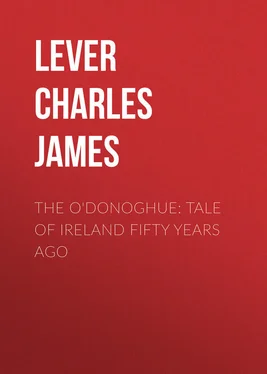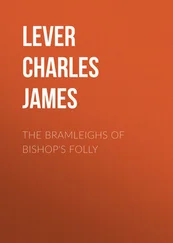Charles Lever - The O'Donoghue - Tale of Ireland Fifty Years Ago
Здесь есть возможность читать онлайн «Charles Lever - The O'Donoghue - Tale of Ireland Fifty Years Ago» — ознакомительный отрывок электронной книги совершенно бесплатно, а после прочтения отрывка купить полную версию. В некоторых случаях можно слушать аудио, скачать через торрент в формате fb2 и присутствует краткое содержание. Издательство: Иностранный паблик, Жанр: literature_19, foreign_antique, foreign_prose, на английском языке. Описание произведения, (предисловие) а так же отзывы посетителей доступны на портале библиотеки ЛибКат.
- Название:The O'Donoghue: Tale of Ireland Fifty Years Ago
- Автор:
- Издательство:Иностранный паблик
- Жанр:
- Год:неизвестен
- ISBN:нет данных
- Рейтинг книги:4 / 5. Голосов: 1
-
Избранное:Добавить в избранное
- Отзывы:
-
Ваша оценка:
- 80
- 1
- 2
- 3
- 4
- 5
The O'Donoghue: Tale of Ireland Fifty Years Ago: краткое содержание, описание и аннотация
Предлагаем к чтению аннотацию, описание, краткое содержание или предисловие (зависит от того, что написал сам автор книги «The O'Donoghue: Tale of Ireland Fifty Years Ago»). Если вы не нашли необходимую информацию о книге — напишите в комментариях, мы постараемся отыскать её.
The O'Donoghue: Tale of Ireland Fifty Years Ago — читать онлайн ознакомительный отрывок
Ниже представлен текст книги, разбитый по страницам. Система сохранения места последней прочитанной страницы, позволяет с удобством читать онлайн бесплатно книгу «The O'Donoghue: Tale of Ireland Fifty Years Ago», без необходимости каждый раз заново искать на чём Вы остановились. Поставьте закладку, и сможете в любой момент перейти на страницу, на которой закончили чтение.
Интервал:
Закладка:
“‘Twas a blessed gospel he gave him,” said Mary, who did not comprehend the French portion of the story, “and sure it’s as good as any thing.”
“We all thought so, Mary. Poor Maurice related the story at Lyons, when he was led out to the guillotine – but though the Commissaire laughed heartily, and enjoyed it much, they had found a breviary in his portmanteau, and they couldn’t let him off. Pauvre bête! To travel about the world with the ‘pièce de conviction’ in his possession. What, Harry, no more wine?”
“I thank you, no more for me, although that claret is a temptation.”
“A bouquet, every glass of it! What say you, Master Lawler – does it suit your palate?”
“I begin to think it a taste cold, or so, by this time,” said Lanty; “I’m not genteel enough for wine, God help me – but it’s time to turn in, any how – and there’s Mary asleep already.”
“I don’t stir till I finish the flask,” said Jacques, firmly; “and if you won’t drink, you needn’t grudge me your company. It’s hard to say when we meet again. You go northward, Talbot, isn’t that so?
“Yes, and that’s the point I wish to come to – where and how shall I find a mount? – I depended on this priest you spoke of to meet me, but he has not made his appearance.”
“You never fell upon your legs more fortunately – here’s your man for a horse, all Ireland over. Eh, Lanty, what’s to be had now?”
“Devil a thing can be got for love or money,” said Lanty. “If the gentleman only told me yesterday – ”
“Yesterday, Master Lanty, we were riding white horses in the Western Ocean – but that’s gone by – let us talk of to-day.”
“My own hackney is here in the stable. If his honour likes him, I’ll sell him; but he’s a fancy beast, and must have a fancy price.”
“Has he strength and speed for a fast ride,” said Talbot, “and will his condition bear it?”
“I’ll answer for it – you may push on to Cork in a hand gallop, if you give him ten minutes’ rest, and a glass of whiskey at Macroom.”
“That’s enough – what’s his price?”
“Take a look at him first,” replied Lanty, “for if you are judge of a beast, you’ll not refuse what I ask you.” With these words he lighted a candle, and placed it in an old iron lantern, which hung against the wall, and opening a small door at the back of the cabin, proceeded, by a narrow passage cut in the rock, towards the stable, followed by Talbot, Flahault remaining where he was, as if sunk in meditation. Scarcely, however, had the two figures disappeared in the distance, when he shook Mary violently by the shoulder, and whispered in a quick, but collected tone —
“Mary – Mary, I say – is that fellow all safe?”
“Ay is he safe,” said she, resuming her wonted calmness in a second. “Why do you ask now?”
“I’ll tell you why – for myself I care not a sous – I’m here to-day, away to-morrow – but Talbot’s deep in the business – his neck’s in the halter – can we trust Lawler on his account – a man of rank and large fortune as he is, cannot be spared – what say you?”
“You may trust him, Captain,” said Mary, “he knows his life would not be his own two hours if he turned informer – and then this Mr. Talbot, he’s a great man you tell me?”
“He’s a near kinsman of a great peer, and has a heavy stake in the game – that’s all I know, Mary – and, indeed, the present voyage was more to bring him over, than any thing else – but hush, here they come.”
“You shall have your money – you’ve no objection to French gold, I hope – for several years I have seen no other,” said Talbot entering.
“I know it well,” said Lanty, “and would just as soon take it, as if it had King George on it.”
“You said forty pounds, fifty Louis is not far off – will that do?” said the youth, as he emptied a heavily filled purse of gold, upon the table, and pushed fifty pieces towards the horse-dealer.
“As well as the best, sir,” said Lanty, as he stored the money in his long leathern pocket-book, and placed it within his breast pocket.
“Will Mrs. M’Kelly accept this small token, as a keepsake,” said the youth, while he took from around his neck a fine gold chain of Venetian work, and threw it gallantly over Mary’s; “this is the first shelter I have found, after a long exile from my native land; and you, my old comrade, I have left you the pistols you took a fancy too, they are in the lugger – and so, now good-bye, all, I must take to the road at once – I should like to have met the priest, but all chance of that seems over.”
Many and affectionate were the parting salutations between the young man and the others; for, although he had mingled but little in the evening’s conversation, his mild and modest demeanour, added to the charm of his good looks, had won their favourable opinions; besides that he was pledged to a cause which had all their sympathies.
While the last good-bye was being spoken, Lanty had saddled and bridled the hackney, and led him to the door. The storm was still raging fiercely, and the night dark as ever.
“You’d better go a little ways up the glen, Lanty, beside him,” said Mary, as she looked out into the wild and dreary night.
“‘Tis what I mean to do,” said Lanty, “I’ll show him as far as the turn of the road.”
Though the stranger declined the proffered civility, Lanty was firm in his resolution, and the young man, vaulting lightly into the saddle, called out a last farewell: to the others, and rode on beside his guide.
Mary had scarcely time to remove the remains of the supper, when Lanty re-entered the cabin.
“He’s the noble-hearted fellow, any way,” said he, “and never took a shilling off the first price I asked him;” and with that he put his hand into his breast pocket to examine, once more, the strange coin of France. With a start, a tremendous oath broke from him – “My money – my pocket-book is lost,” exclaimed he, in wild excitement, while he ransacked pocket after pocket of his dress. “Bad luck to that glen, I dropt it out there, and with the torrent of water that’s falling, it will never be found – och, murther, this is too bad.”
In vain the others endeavoured to comfort and console him – all their assurances of its safety, and the certainty of its being discovered the next morning, were in vain. Lanty re-lighted the lantern, and muttering maledictions on the weather, the road, and his? own politeness, he issued forth to search after his treasure, an occupation which, with all his perseverance, was unsuccessful; for when day was breaking, he was still groping along the road, cursing his hard fate, and every thing which had any share in inflicting it.
“The money is not the worst of it,” said Lanty, as he threw himself down, exhausted and worn out, on his bed. “The money’s not the worst of it – there was papers in that book, I wouldn’t have seen for double the amount.”
Long after the old smuggler was standing out to sea the next day, Lanty Lawler wandered backwards and forwards in the glen, now searching among the wet leaves that lay in heaps by the way side, or, equally in vain, sounding every rivulet and water-course which swept past. His search, was fruitless; and well it might be – the road was strewn with fragments of rocks and tree-tops for miles – while even yet the swollen stream tore wildly past, cutting up the causeway in its passage, and foaming on amid the wreck of the hurricane.
Yet the entire of that day did he persevere, regardless of the beating rain, and the cold, drifting wind, to pace to and fro, his heart bent upon recovering what he had lost.
“Yer sowl is set upon money; devil a doubt of it, Lanty,” said Mary, as dripping with wet,# and shaking with cold, he at last re-entered the cabin; “sorra one of me would go rooting there, for a crock of goold, if I was sure to find it.”
Читать дальшеИнтервал:
Закладка:
Похожие книги на «The O'Donoghue: Tale of Ireland Fifty Years Ago»
Представляем Вашему вниманию похожие книги на «The O'Donoghue: Tale of Ireland Fifty Years Ago» списком для выбора. Мы отобрали схожую по названию и смыслу литературу в надежде предоставить читателям больше вариантов отыскать новые, интересные, ещё непрочитанные произведения.
Обсуждение, отзывы о книге «The O'Donoghue: Tale of Ireland Fifty Years Ago» и просто собственные мнения читателей. Оставьте ваши комментарии, напишите, что Вы думаете о произведении, его смысле или главных героях. Укажите что конкретно понравилось, а что нет, и почему Вы так считаете.












